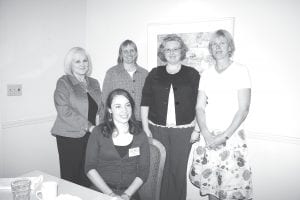The Women’s Business Network luncheon at The Pie Place in Grand Marais on Wednesday, April 28 focused on preventing sexual harassment in the workplace. Networking after the presentation were (L-R) Candice Harshner, Executive Director of the Program for Aid to Victims of Sexual Assault (PAVSA); Kirstin van den Berg, Higher Education; Dawn Johnson, Northeast Entrepreneur Fund; Paula Sundet Wolf, Higher Ed. Seated is Sarah Fries of PAVSA.

Establishing a harassment policy is important, attendees at the April 28 Women’s Business Network learned, but more important is enforcing it and protecting someone who reports harassment.
Candice Harshner, who has served as executive director of the Program for Aid to Victims of Sexual Assault for 12 years, and Sarah Fries, who oversees the Sexual Assault Nurse Examiner (SANE) program, were the speakers on this important topic. Both have worked with businesses to provide training on sexual harassment and sexual violence.
Harshner said the problem of sexual harassment is a frequent problem in a tourism community, with a large number of young workers. However, she said sexual harassment could happen to anyone—man or woman—of any age.
Employers can set the tone, said Fries. She said it isn’t hard to stop harassment with simple statements—“We don’t allow back rubs at work” or “We don’t allow dirty jokes in this office.”
However, many people don’t recognize harassment or they accept such behavior. In a high profile case of sexual harassment in Duluth, all of the witnesses interviewed agreed that certain actions had taken place. However, not all agreed the behavior was harassment. Some said, “Oh, that’s just the way he is.”
Harshner said offenders need clear guidelines and they should be held accountable. Sometimes the reporter is punished—moved to another shift, for example. Besides being unfair, it does not solve the problem. “If someone in your workplace is harassing one person, it’s likely they are harassing others.”
It is better to attempt to educate the offender and document the incident. Fries said, “Most businesses or agencies have a three strikes policy for other things—being late for work, for example. Businesses can have a three-strike policy for sexual harassment as well.”
“Unfortunately, people who do this are really good at picking out people who are vulnerable—those with mental health or selfesteem issues,” said Fries, noting that employers must let their staff know they can safely report harassment.
When Harshner and Fries were done speaking, they answered questions and the topic turned to the difficult situation of international workers in Cook County. Some of these young workers have nowhere to turn if they face sexual harassment. They are worried about having to leave the United States if they file any sort of complaint.
Harshner and Fries suggested the community find a way to ensure that this does not happen. Just as a business should create a culture where people are comfortable talking about sexual harassment and reporting it, a community could band together to prevent it.
The luncheon over, attendees left with a newfound goal—to establish sexual harassment guidelines in the workplace—and the community overall.
The Women’s Business Network luncheon is sponsored by Cook County Higher Education and the Northeast Entrepreneur Fund’s Women’s Business Network. The next luncheon will be Wednesday, May 26 from 11:30 a.m. – 1:00 p.m. at a location to be determined. The luncheon topic will be “Marketing Your Business.”
For more information or to register for the luncheon, please email highered@boreal.org or call Cook County Higher Education at 387- 3411.
Staff reports
The Violence Prevention Center provides free and confidential services to all affected by domestic violence or sexual assault in Cook County. The officein Grand Marais has a variety of books available on the subject. A few titles of helpful literature are:
l May I Kiss You? —
Of all the elements of
consent, “asking permission” is the most
fundamental. This book provides young
adults with both an explanation and
practical advice.
l Kids Helping Kids —
In each chapter,
child survivors show what sexual abuse is.
Captures the way kids speak about their
experiences.
l After Silence: Rape And My Journey
Back —
A New York Times Notable Book
for 1998. The author takes us through her
personal journey of recovery.
l Voices of Courage —
Collection of female
and male survivor stories told through
poetry, journals and stories.
l Allies In Healing: When The Person
You Love Was Sexually Abused As
A Child —
Offers practical advice and
encouragement to all partners trying to
support survivors while tending to their
own needs.
Books may be checked out through the Violence Prevention Center or the Grand Marais Public Library. Call (218) 387-1262 for more information.


Loading Comments